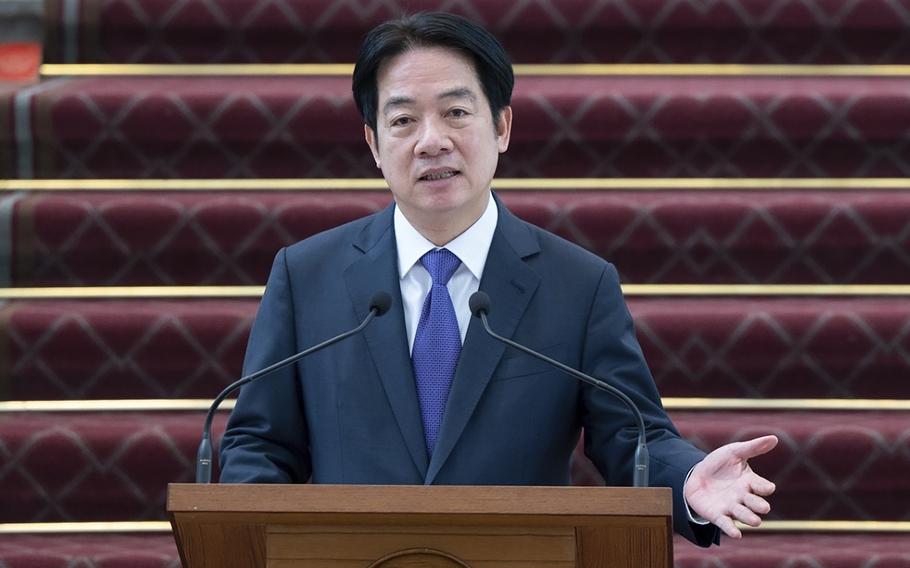
Taiwan President Lai Ching-te speaks at a press conference in Taipei on Feb. 14, 2025. (Taiwan Presidential Office via AP)
TAIPEI, Taiwan — Chinese espionage in Taiwan has reached new levels, analysts and officials say, after three soldiers who were tasked with guarding the Taiwanese president’s office were jailed for photographing and selling classified information.
The three former members of a military battalion responsible for the security of the presidential building, as well as a soldier from a unit focused on information warfare, were sentenced this week to up to seven years in prison.
“The presidential office should be the most secure place, yet incidents like this still happen. This shows how severe China’s infiltration is in Taiwan,” said Chung Chih-tung, an assistant research fellow at the Institute for National Defense and Security Research, a government-funded think tank.
The cases fit into a broader pattern of intimidation by Beijing as it tries to undermine Taiwan’s defenses both militarily and psychologically and push the island democracy to surrender to Chinese Communist Party rule. The effort includes huge military exercises around the island.
According to prosecutors, soldiers Lai Chong-yu and Chen Wen-hao were recruited by Chinese intelligence agents through a man named Huang Tsung-yi, a Taiwanese citizen accused of acting on Beijing’s behalf to persuade soldiers to sell information to China.
Huang fled to China before he could be arrested, according to Taiwanese officials.
Lai and Chen — the former a member of Taiwan’s 211th Military Police Battalion, which guards the presidential office in Taipei, and the latter a member of the Defense Ministry’s information and telecommunications command — took photos of “official secret internal military information.” Lai then passed those photos to Huang or directly to Chinese agents.
After Lai retired in 2023, two other soldiers, Li Yu-er and Lin Yu-kai, continued to take photos of documents and pass them to Chinese agents, the prosecutors said in Taipei District Court. Officials did not describe the type of documents photographed.
The soldiers received payments of $8,000 to $20,000 between 2022 and 2024.
“Their acts betrayed the country and endangered national security,” the court said in a statement.
The soldiers were not charged with espionage because the information was not classified as “confidential.” It did, however, contain internal documents from the presidential office that should not have been disclosed to the public, according to the court statement.
All four soldiers were convicted of corruption for accepting bribes, while Lai and Chen were also charged with violating Taiwan’s national security law, which carried an additional penalty of eight months. In total, the soldiers were given prison sentences ranging from five years and 10 months to seven years.
Even in cases in which military officers are charged with espionage, the punishment is often light.
“Taiwan’s sentencing on espionage activities has been too lenient, which means it is not enough of a deterrent,” Chung said.
President Lai Ching-te, who has taken an increasingly tougher approach toward Beijing since entering office last May, called this month for bringing back martial-law-era military courts to more swiftly and severely deal with spying in Taiwan’s military.
“Lately, China has been taking advantage of democratic Taiwan’s freedom, diversity and openness to recruit gangs, the media, commentators, political parties and even active-duty and retired members of the armed forces and police to carry out actions to divide, destroy and subvert us from within,” the president said.
Taiwanese authorities have ramped up prosecutions of active and retired members of the military, who have long been a target of Chinese espionage efforts.
Now, Chinese intelligence is targeting rank-and-file soldiers as well as senior officers through social media, gaming platforms, and websites advertising loans, according to a report last year by the auditing arm of Taiwan’s government.
Last year, authorities tried 64 people on charges of spying for China, more than half of whom were active or retired military members. In 2022, 10 people were prosecuted.
Taiwanese prosecutors said this month that they were investigating two air force members, one retired and one active, for possibly leaking details about one of the island’s most advanced missile systems to Chinese agents.
“To its credit, the Taiwan government and military have stepped up their counterintelligence effort over the past decade, which partially accounts for the apparent increase in cases. More cases are coming to light,” said Drew Thompson, a former Pentagon official focused on China, Taiwan and Mongolia who is now at the S. Rajaratnam School of International Studies in Singapore.
The latest cases come as Taiwan’s security relationship with the United States, its most important military backer against threats of force from Beijing, has been thrown into question. Beijing maintains that Taiwan, home to about 23 million people, is part of China, and Chinese leader Xi Jinping says he will use force if necessary to realize “reunification.”
For years, the United States has sold weapons to Taiwan and provided military training to help shore up the democracy’s defenses, even though Taipei and Washington do not have a formal diplomatic relationship.
A key deterrent against Beijing has been Washington’s use of “strategic ambiguity,” a deliberately vague position on whether the United States would militarily intervene to stop a Chinese takeover. Under President Donald Trump’s more transactional approach, it is now even more uncertain whether Washington would come to Taiwan’s aid.
Trump and Elbridge Colby, his nominee for undersecretary of defense for policy, have called on Taiwan to do and pay more to defend itself. Analysts say Taipei’s latest crackdown on espionage helps show Washington that Taiwan is serious about plugging leaks in the military.